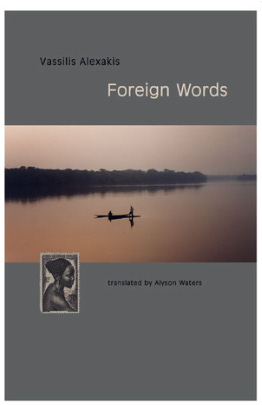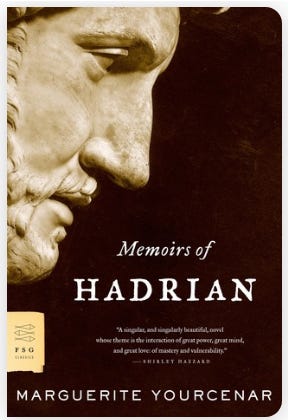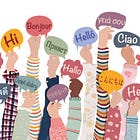Readings for Languages Lovers
Stories, books, and voices for those who live between words and worlds
Welcome to The Inclusion Room — a space where literature, science, and storytelling meet to unlock the power of diversity, inspiring both personal and professional growth.
This post is for language lovers.
Some of us have embraced new languages while living abroad, finding in them a doorway into another culture. For others, languages feel like new friends we meet along the road of life. For some, languages have become both a life and a career.
As for me, until the age of 22, I didn’t speak any language other than my own, Italian. I could translate Ancient Greek and Latin, but speaking a living language was difficult. Today, 20 years later, I am a polyglot—and deeply in love with languages. That’s why I’ve started to explore what draws people into languages, and what these encounters make of us.
Here’s what I’ve gathered for you this time:
📚 Two books that tell what it means to live between languages and worlds
💌 Two Substacks where languages step into the spotlight
📻 An Application I used to learn German
📚 Books
Foreign Words - Vassilis Alexakis
Vassilis Alexakis was a Greek writer who emigrated to France and built a remarkable body of work in both languages. His recurring themes, exile, dual belonging, and language as a vessel of memory and identity, speak to anyone navigating between worlds. What makes his work unique is that he translated his own books, carrying them from one language to another himself.
I’ve always been fascinated by writers who choose to write in their adopted language. It feels like a declaration of love, just as Milan Kundera.
“I notice that everything has two names for me: one in Greek and the other in French (…). I also realize that I don’t see objects in the same way depending on which language I name them in.”
I first came across Foreign words in a Parisian bookstore, and it immediately resonated with my love of words, especially foreign ones. What captivates me in learning a new language is this process of taming: words that begin as a simple string of letters gradually become a sound, and then an image. Each time, it feels like a fresh beginning.
This book touched me deeply, not only as a language lover but also, and even more so, as an immigrant who lives daily between two languages.
“In which language do you think?
When I am in Greece, I think in Greek.
When I write in French, I think in French.
I couldn’t tell you which language I would prefer on a desert island.”
In this book, Alexakis weaves his relationship with French and his double linguistic identity together with the death of his father, with the inheritance of his country, and with colonialism, which erased local languages—languages that nonetheless found their way back.
“Languages give back the attention you pay to them. They tell you stories only to encourage you to tell your own.”
The main character, Alexakis’ alter ego, decides to learn Sango, a language spoken in Central Africa, word by word from his Paris apartment. The first word he learns is baba—“father.”
Later, he completes his first sentence: baba ti mbi a kui — “My father is dead.”
His father accompanies him, symbolically, on his journey to Central Africa, where he learns that Sango had to invent a word for “colony”: the servant country. Because a language is always alive with its own history.
This was the first of Alexakis’ novels to be translated into English (Foreign Words, 2006).
And if you are a French- or Greek-speaker, his entire bibliography is waiting for you.
Memoirs of Hadrian - Marguerite Yourcenar
What is the connection between languages and this book about Hadrian’s life? Hadrian reigned over a vast empire, honoring all cultures and languages. He lived his life between two worlds, an education taught in Greek and a destiny written in Latin.
Reading Memoirs of Hadrian means immersing yourself in the journey of an emperor who travels through the various regions of his vast empire with enlightened curiosity.
It’s like seeing through his gaze, refined by countless readings, and discovering cultural diversity as a wealth to be celebrated.
Appreciating languages as keys to different worlds: Latin, used for governance, blends with Greek, which guides his thoughts and orients him in his most intimate reflections.
As we accompany Hadrian on this journey, we experience with him the unification of an empire built like a mosaic of cultures, reflecting the identity of this extraordinary man born in Spain, educated in Greek, and leading as a Roman.
💌 On Substack
Love to Lingo
In this publication, Christina shares actionable insights, tools, and strategies to help you build or refine your language-learning practice. She writes from her own experience of learning new languages, and her love for words shines through every line.
She has also launched a series of posts ‘How I learn languages’ where people share their personal stories with languages.
I’m delighted to share that I’ll be part of the series on November. Stay tuned!
Palto’
This a newsletter that explores life through the lens of multilingualism. It often focuses on storytelling, and also wanders into related territories, geography, education, literature, and the many ways languages shape our world.
It was through these pages that I first discovered Alexakis—thanks to this post:
📻 An application to learn German
When I first sat in a meeting where everyone spoke German, I couldn’t understand a single word, and I had one year to change that and secure a permanent contract at my company.
I threw myself into many things: immersions, Assimil method, intensive courses… But what helped me build confidence and expand my vocabulary was having Die Deutsche Welle Deutsch lernen in my ears during every commute!
You’ll find exercises, articles, news, music and podcasts for all levels, so you can practice every aspect of the language, anytime and anywhere, at your own pace!
✍ Some of my other writings on languages that could be of interest to you:
👀 This post belongs to the Inclusion Virtual Library. You can explore the previous editions here:
The Inclusion Virtual Library
One of Inclusion Room’s ambitions is to create a virtual library of books and resources that will bring together knowledge and insights to:
📣 Join the Conversation
I’d love to hear your recommendations for the Virtual Library!
What’s the best book or resource you’ve read about Languages?








Thank you for this. I also wrote a post recently about embracing the (messy!) process of learning Dutch, so your reading list has showed up in my scroll at the right time :).
Will be checking out those other Substacks!
Oh how wonderful—I know that feeling of mental math to speak between two languages well!
Is that the application you worked on in the Haagse Bieb!?